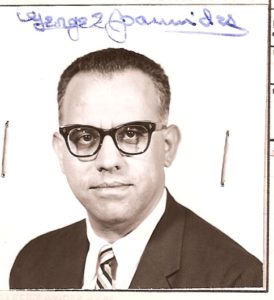Our current ongoing conference “The National Security State and the Kennedy Assassination” continues this week with part 1 of a two-part presentation by Jefferson Morley entitled “Morley v. CIA: My Unfinished JFK Investigation.” Wednesday evening at 7 pm. Eastern Time via zoom. Register at our conference website.
Morley is a former investigative reporter for the Washington Post. He is also the author of several books — Our Man in Mexico, a biography of Win Scott, the CIA’s top spy chief in Mexico in the 1960s; The Ghost, a biography of legendary CIA spymaster James Jesus Angleton; Snow-Storm in August, a story about a white riot in Washington, D.C., in 1835; and two FFF books relating to the Kennedy assassination: JFK and CIA: The Secret Assassination Files and Morley v. CIA: My Unfinished JFK Investigation.
One of the most brilliant (in a cunning way) aspects of the national-security state regime-change operation on November 22, 1963, was to pin the crime on a “communist.” The reason I put “communist” in quotation marks is that as the evidence has surfaced over the years, it has become increasingly clear that former U.S. Marine Lee Harvey Oswald wasn’t a genuine communist but rather a U.S. intelligence operative trained to be a communist infiltrator.
After all, how many communist Marines have you ever met? Communists hate Marines and vice versa. Marines kill communists. Just ask the people of North Korea and Vietnam. Why would a communist want to be part of an organization in which he could be ordered to kill communists? Why would the Marines permit a communist to be a part of their organization, especially since he could be relaying classified information to the supposed international communist conspiracy to take over the United States and the rest of the world? If Oswald was a real communist who attempted to defect to the Soviet Union and promised to give them classified information, why wasn’t he ever indicted and prosecuted when he returned to the U.S.?
Why would the orchestrators of a presidential assassination use a “communist” as a patsy — that is, someone they would frame for the crime? Because in November 1963, there were few things worse that could befall an American than to be labeled a communist. This was the height of the Cold War. Recall the McCarthy hearings, Dalton Trumbo, and all of the anti-communist harassment and persecution of anyone who had ever been a member of the Communist Party. People who were labeled a communist lost their jobs and had their lives destroyed.
By framing a “communist,” the Pentagon and the CIA could ensure that people would be unwilling to challenge the official narrative of the assassination — that a lone-nut communist killed the president. People on the right were not about to come to assistance of a communist, given their right-wing mindsets. And people on the left were induced to keep their mouths shut, owing to the fear of being labeled a communist sympathizer.
The very first organization to publicize Oswald’s bonafides was the DRE, an anti-Castro organization in New Orleans that was composed of Cuban exiles. Immediately after the assassination, they sent out a press release publicizing that Oswald was a communist. The press release was based on unusual encounters between Oswald and the DRE during Oswald’s time in New Orleans.
What no one knew in 1963 was that the DRE was being secretly funded by the CIA and closely supervised by a CIA agent named George Joannides. The CIA and Joannides decided to keep that information secret from the Warren Commission.
When the Kennedy assassination came under renewed scrutiny in the 1970s by the House Select Committee on Assassinations, the CIA called Joannides out of retirement to serve as an obstacle to the committee’s securing secret assassination-related records from the CIA. Once again, neither the CIA nor Joannides disclosed the role that Joannides and the CIA had played with the DRE.
In the 1990s, the Assassination Records Review Board was called into existence to enforce the JFK Records Act, which forced the Pentagon, the CIA, and other federal agencies to release their secret assassination-related records. Once again, the CIA and Joannides kept their relationship with the DRE secret from the committee.
Morley uncovered the CIA’s and Joannides’s relationship to the DRE and began inquiring about it. Predictably, the CIA chose to remain mum. So Morley sued them under the Freedom of Information Act. His talk will provide a fascinating account of the DRE, Joannides, and Morley’s long battle with the CIA. It will also bring people up to date on the assassination-related records and information that the CIA is still fighting to be kept secret, on grounds of “national security” of course.




